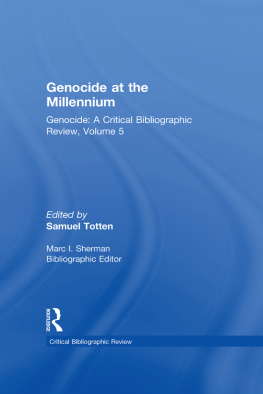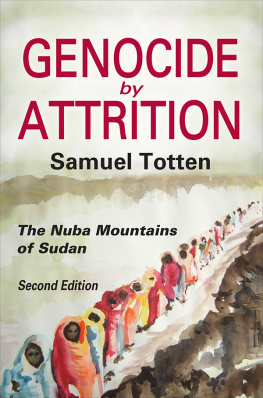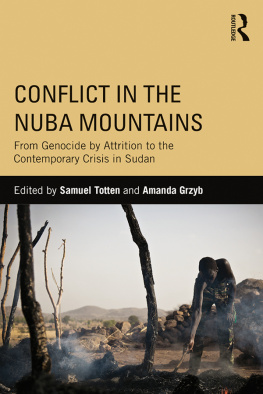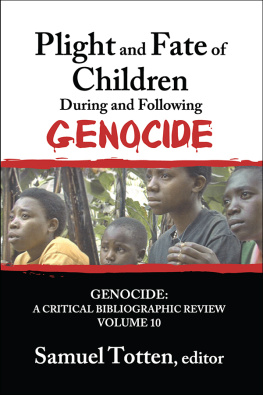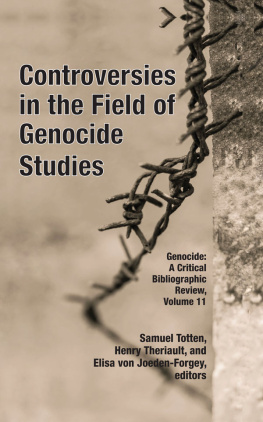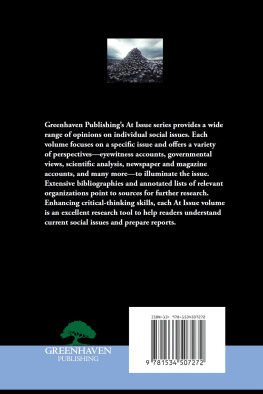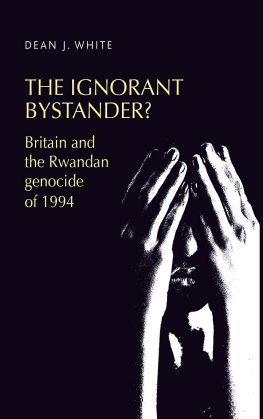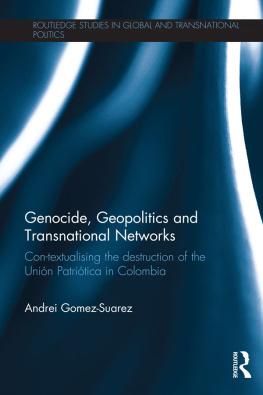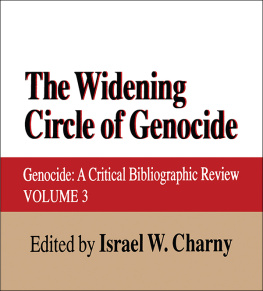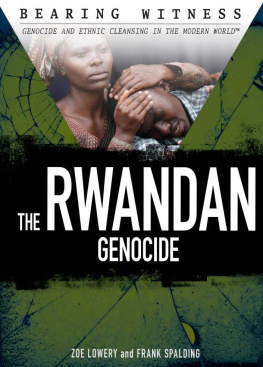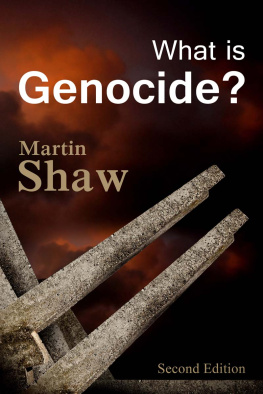Genocide at the Millennium
Volume 5 in the Series
Genocide: A Critical Bibliographic Review
First published 2005 by Transaction Publishers
Published 2017 by Routledge
2 Park Square, Milton Park, Abingdon, Oxon OX14 4RN
711 Third Avenue, New York, NY 10017, USA
Routledge is an imprint of the Taylor & Francis Group, an informa
Copyright 2005 by Institute on the Holocaust and Genocide.
All rights reserved. No part of this book may be reprinted or reproduced or utilised in any form or by any electronic, mechanical, or other means, now known or hereafter invented, including photocopying and recording, or in any information storage or retrieval system, without permission in writing from the publishers.
Notice:
Product or corporate names may be trademarks or registered trademarks, and are used only for identification and explanation without intent to infringe.
Library of Congress Catalog Number: 2004059881
Library of Congress Cataloging-in-Publication Data
Genocide at the millennium: a critical bibliographical review / Samuel Totten,
editor; with a foreword by Israel W. Charny; Marc I. Sherman, bibliographic
editor.
p. cm.(Genocide; v. 5)
Includes index.
ISBN: 978-0-7658-0263-7
1. Genocide. 2. GenocideBibliography. I. Totten, Samuel. II.
Sherman, Marc I. III. Series.
Z7164.G45 G45 1988 vol. 5
[HV6322.7}
016.304663sdc22
[304.663] 2004059881
ISBN 13: 978-0-7658-0263-7 (hbk)
I am very pleased and honored to welcome Samuel Totten as the new series editor of Genocide, A Critical Bibliographic Review beginning with this fifth volume in the series. In addition, I am also happy to welcome Samuel Totten as the specific editor of this volume, Genocide at the Millennium, volume 5 in the series. If promotions were in order from within the ranks of the contributors to previous volumes, then certainly Sam is the deserving professional person to move up to edit the series based on his previous contributions beginning with the first volume of Genocide, A Critical Bibliographic Re-view in 1988; continuing in 1992 with Genocide, A Critical Bibliographic Review. Volume 2; and then in 1998, The Widening Circle of Genocide: volume 3 in the series. Beyond the sheer number of valuable chapters that Samuel Totten himself wrote (six chapters in these first three volumes), the fact was that in these assignments, he was undertaking time after time to research the terra incognita of topics that few if any genocide scholars had researched earlier, for example, the literature, art and film of the Holocaust, genocide and futuristic destruction; first-person accounts of genocide; education about genocide; nuclear proliferation and its genocidal implications; and nongovernmental organizations working on the subject of genocide.
As if this were not enough, throughout the series Sam was an indefatigable collaborator, critic, and advisor, volunteering important and creative insights into the development of the series as well as always available to give of himself to solve problems and needs that arose. It was apt to have him move up to the role of associate editor of volume 3, The Widening Circle of Genocide, 1996*; and it is our privilege to have him now assume the chief role of series editor as well as editor of this volume.
From the beginning, this award-winning series has made an invaluable contribution to scholars and students by bringing together the key literature on a subject matter in genocide studies, accompanying most of the citations with annotations that summarize the content direction and also periodically evaluate the significance and value of a work, in the context of an accompanying review essay on the developments of scholarship in this area and the needs for future research and thinking in this subject area.
Even in todays age of electronic information, to my knowledge there is no comparable assembly of information on the thinking and publications in the field of Holocaust and genocide studies anywhere.
From the very first volume, my greatest joy and gratification has been to see dog-eared used copies of the books sitting prominently on the desks and accessible library shelves of colleagues whom I was visiting, because these were the living useful research tools that they really went to in their work. Time after time, I have been told by colleagues, and now in recent years by the first graduate students in Holocaust and genocide studies at several universities, how these critical reviews got them started meaningfully in one project after another.
The present volume, Genocide at the Millennium. volume 5 in the series, also makes a strong contribution to current genocide studies. It brings together a tremendous number of new citations and produces for the reader, as is the tradition of this series, a very rich and plentiful series of annotated bibliographic references to a series of the truly new and contemporary issues in genocide scholarship including: genocide in Bosnia and Herzegovina; genocide in Kosovo; the United Nations in prevention, intervention and prosecution of genocide; the Rwandan genocide; the changing roles of non-governmental organizations in intervention, prevention and punishment of genocide including in the 2000s; the role of individual states in addressing cases of genocide; the coming of age of international legal prohibition of genocide; the UN International Criminal Tribunal for Rwanda; the UN International Criminal Tribunal for the Former Yugoslavia; and the need for an International Criminal Court.
Each chapter is again anchored in a thoughtful, authoritative interpretive essay on the subject by very acknowledged and fine scholar of genocide (including in at least one case probably the outstanding authority in the world on the subject). This volume is a most meaningful and very valuable assay of genocide in human affairs at the millennium, which will benefit every scholar and student of the subject.
Regretfully, I also have a major criticism of one formulation in the book. I am referring to the chapter on genocide in the former Yugoslavia. This is a situation where a basic moral concern of mine is so violated that, were I still the editor, I would not have agreed to the chapter in question being published so long as this formulation were part of it. In the present situation of a new editorial leadership where I have been invited to write a foreword but without having a role in the construction of the book, my protest led to an important clarification by the two co-authors of the chapter in question in which they explain that they do not agree between them on whether or not full-blown genocide occurred. My dear friend and close colleague of many years, Eric Markusen, concludes that the Bosnian Serbs, and also the Bosnian Croats, did commit genocide. His co-author colleague, Martin Mennecke, sticks to a legal definition based on the U.N. Genocide Convention and doubts that genocidefor him only intentional destruction in whole or partoccurred. It is fine for me as a scholar to report that within a legal system, using the U.N. Genocide Convention in all the good that it gives the world and in all of its known limitations, a given case of genocide may not qualify legally as genocide. It is not acceptable to me, even if the scholar is a lawyer, for the scholar to express agreement or possible agreement or even respect for that position in any scholarly paper on genocide.

